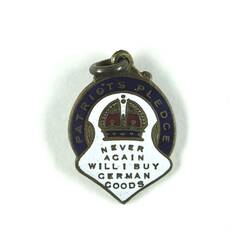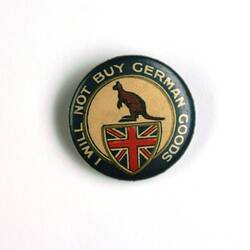Summary
Alternative Name(s): Button, Pendant
World War I period Patriots Pledge enamelled badge inscribed 'Never again will I buy German goods', made by C. Bentley of Melbourne in 1916.
The Patriots League was an organisation of people of British birth or descent who were keen to distinguish themselves from 'disloyalists and shirkers'. They raised money for the war effort and spoke in favour of conscription. The League exhorted all Australians to sign the pledge: 'Believing that when the Great War is over Germany will try to re-establish her commercial power and prepare for future slaughter, and being convinced that it is my duty to support the industries of my own country, empire, and friendly nations, I hereby swear to the best of my knowledge and power, 'never again will I buy German goods or have any dealings with people who try to sell them.'
Physical Description
Cast enamelled badge comprising blue outer ring, central crown with red and blue details, and white panel extending from crown to below blue ring with larger inscription. Loop and ring at top for fastening. Maker's name on reverse.
Significance
The badge provides a rare example of anti-German material culture during World War I (beyond printed posters and postcards), and also recalls the fear that Germany would continue on its path of aggression in another conflict after World War I. The Australian Patriots League exhorted all Australians to sign the pledge: 'Believing that when the Great War is over Germany will try to re-establish her commercial power and prepare for future slaughter, and being convinced that it is my duty to support the industries of my own country, empire, and friendly nations, I hereby swear to the best of my knowledge and power, 'never again will I buy German goods or have any dealings with people who try to sell them.' Membership of the Patriots League cost 2/ per annum, and a badge was given with the first year's subscription - perhaps this badge. (The Maffra Spectator, 26 June 1916) The Patriots League was 'An organisation of men and women of British birth or descent who are proud of the Race, Country, and Empire, and pledge themselves to do all they can for the welfare of Local, National, and Imperial ideals during and after the great war of 1914-16'. The League's motto was 'No "Party" in Politics; no "Sect" in Religion; no "Class" in Society' - in other words, membership was open to people of all religions or political creeds. Its first mission was to support the idea that those who wanted to serve but were unable would be able to wear a badge 'by which they might be distinguished from disloyalists and shirkers'. The Patriots League also provided voluntary workers to build a Red Cross Rest Home at Wirth's Park, Melbourne, carters for the Red Cross Society and wool spinning classes to provide 'interesting and profitable employment' for people in sheep breeding regions. The chief organizer of the Patriots League was a Mr King. On 4 May 1916 the Patriots League held a 'Patriots Parliament', at the Guild Hall, Melbourne, at which members were sworn in (the symbol of allegiance was bread and water) and Mr King moved a motion in support of conscription. At that time the League claimed to have over 3,000 members in the Melbourne area alone. (The Argus, 4 May 1916)
The Patriots League was one of a large number of benevolent societies and privately-run patriotic funds and charities formed during World War I to raise money in support of the war effort. Their work included practical assistance through voluntary work; fund-raising efforts such as raffles, lotteries and special 'days'; and the donation food, vehicles and even buildings. Their efforts provided comfort packages to those serving overseas, raised morale at home by providing an avenue to contribute to the war effort, and supported overseas civilian victims of the war. After the war they provided practical support to veterans and their families, provided funds for care facilities such as repatriation hospitals, and supported the erection of memorials and upkeep of war graves. (State Library of NSW)
More Information
-
Collecting Areas
-
Acquisition Information
Purchase
-
Maker
-
Place Used
-
Place Named
-
Inscriptions
On front: 'PATRIOTS PLEDGE / NEVER / AGAIN / WILL I BUY / GERMAN / GOODS'. On back: 'C. BENTLEY'.
-
Classification
-
Category
-
Discipline
-
Type of item
-
References
State Library of NSW, [Link 1] accessed 6/2/2013 The Maffra Spectator, 26 June 1916, p.3 The Argus, 4 May 1916, p.7
-
Keywords
World War I, 1914-1918, Manufactured Products, Commerce, Retailing, Badges, Patriotic Badges, Patriotism, Conscription



